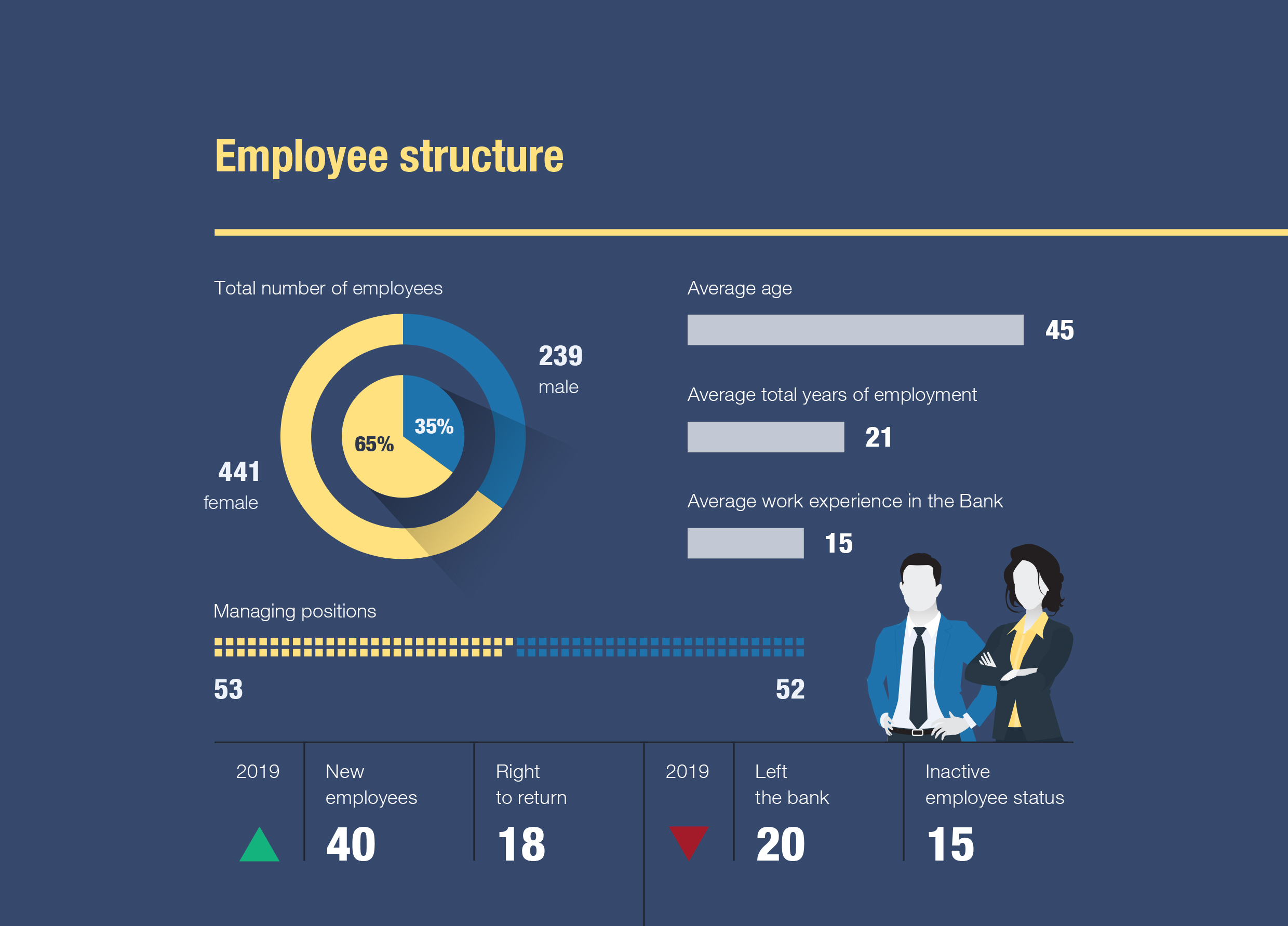Annual Report 2019
Foreword by the Governor

The year behind us was macroeconomically good. Growth accelerated slightly, employment and wages grew and external and internal macroeconomic imbalances narrowed. Monetary policy was accommodative and exchange rate stability was maintained. Household and corporate loans grew sharply amid stimulating private and government sector financing conditions; interest rates were historically low and liquidity was high. Fiscal developments were also favourable. The budget deficit turned into a small surplus in 2018 and 2019 while public debt continued to fall, with its cumulative fall amounting to over ten percentage points of GDP over the past five years. External debt also fell during that period. All of this contributed to Croatia regaining an investment grade rating and exiting a group of countries with excessive macroeconomic imbalances within the European semester.
The preparations for Croatia’s entry into the euro area have been underway for several years now and they basically consist of two elements: macroeconomic measures aimed at reducing internal and external imbalances and structural measures aimed at improving the competitiveness of the Croatian economy. The letter of intent on the entry of Croatia into the European Exchange Rate Mechanism, an essential step towards joining the euro area, was co-signed by the Minister of Finance and myself and submitted on 4 July 2019 to EU institutions, euro area member states and Denmark. In this letter, we commit to undertake a number of reform measures until entry in the ERM II some of which are of very technical nature, such as the asset quality review. There are two reform areas that fall within the area of responsibility of the CNB. They include a further strengthening of banking system supervision through the establishment of close cooperation between the CNB and the ECB that we applied for in May 2019 and improving the framework for macroprudential policy implementation.
In 2019, we stepped up our efforts to establish close cooperation between the CNB and the ECB, primarily in the area of human resources and organisation adjustment and organisation of on-site examination and individual procedural issues. Worth noting is our high involvement in the comprehensive assessment of the quality of assets of five banks, conducted jointly by the CNB and ECB. The entry in the ERM II will have a positive effect on the economy, while Croatian citizens will be able to enjoy both the tangible direct and indirect benefits of this entry, such as interest rate reduction and exchange rate risk reduction. To make this process permanent and sustainable, it is vital to pursue a wise economic policy in conjunction with a more decisive action to eliminate structural vulnerabilities and increase potential growth following entry in the ERM II.
We monitored the acceleration in the growth of general-purpose cash loans that account for approximately 12% of the banking system assets. Although they did not pose a threat to system stability since bank capital is greater than the amount of these loans, we issued a recommendation to banks in regard to granting of these loans. Namely, we estimated that further growth in consumer lending, coupled with very lax credit standards, might hinder debt repayment or even bring it to a halt in the case of deterioration in economic activities. A small slowdown in the growth of cash loans is exclusively the result of compliance with CNB recommendation, which was equally effective for system stability and consumer welfare.
In 2019, the CNB worked hard on regulatory and organisational changes in the field of technological innovation in financial and banking services, which will change banking and payment system as we know them today. Mobile banking has long changed traditional banking and is now replacing internet banking. The number of transactions initiated through a mobile phone exceeded the number of internet transactions. The new Payment Services Directive enables non-bank companies access to deposit accounts of customers, subject to customer authorisation, to make transactions or manage finances on their behalf. This enhances competition and provides benefits for consumers. Technology provides the convenience of simple and quick use but it also carries the risk of recklessness. New technology poses challenges for the regulator in terms of striking a balance between encouraging innovation, benefits for consumers and a timely recognition and possible regulation of risks.
Last year we made major progress on the path towards joining the European Exchange Rate Mechanism and banking union. It was a successful year for us, economically and from the standpoint of achieving CNB objectives. As always, prudent CNB policy, guided exclusively by the principles of the profession and concern for the economic welfare of citizens and entrepreneurs, increased the resilience of the economy and created reserves needed to act in a time of crisis. Reserves management, monetary policy, banks’ capital requirements, payment system, cash supply and everything else that we did in the central bank for the general good in 2019 may only be evaluated in the most challenging of times. And, at the time of publication of this report, we know that the year 2020 is exactly that.
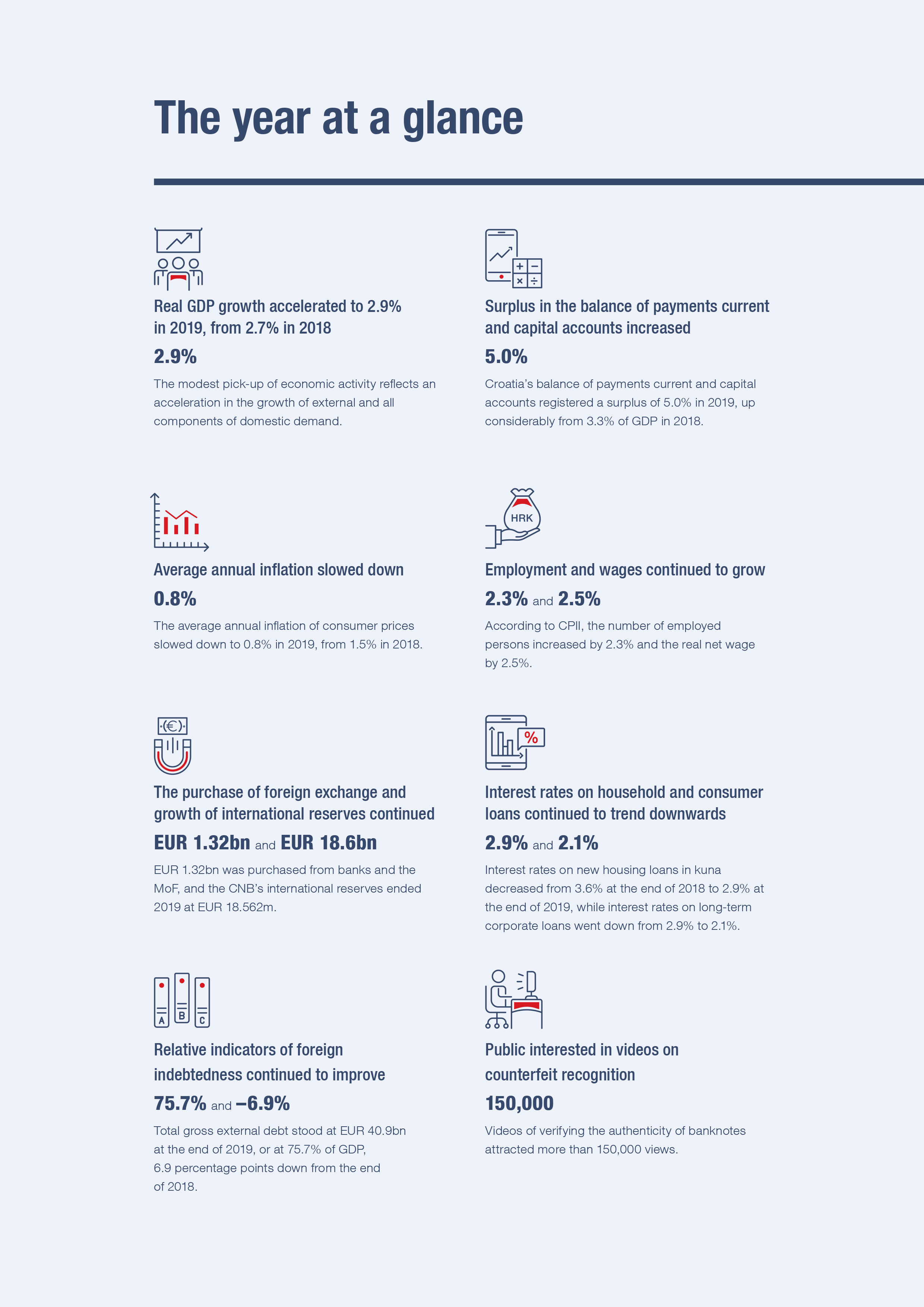
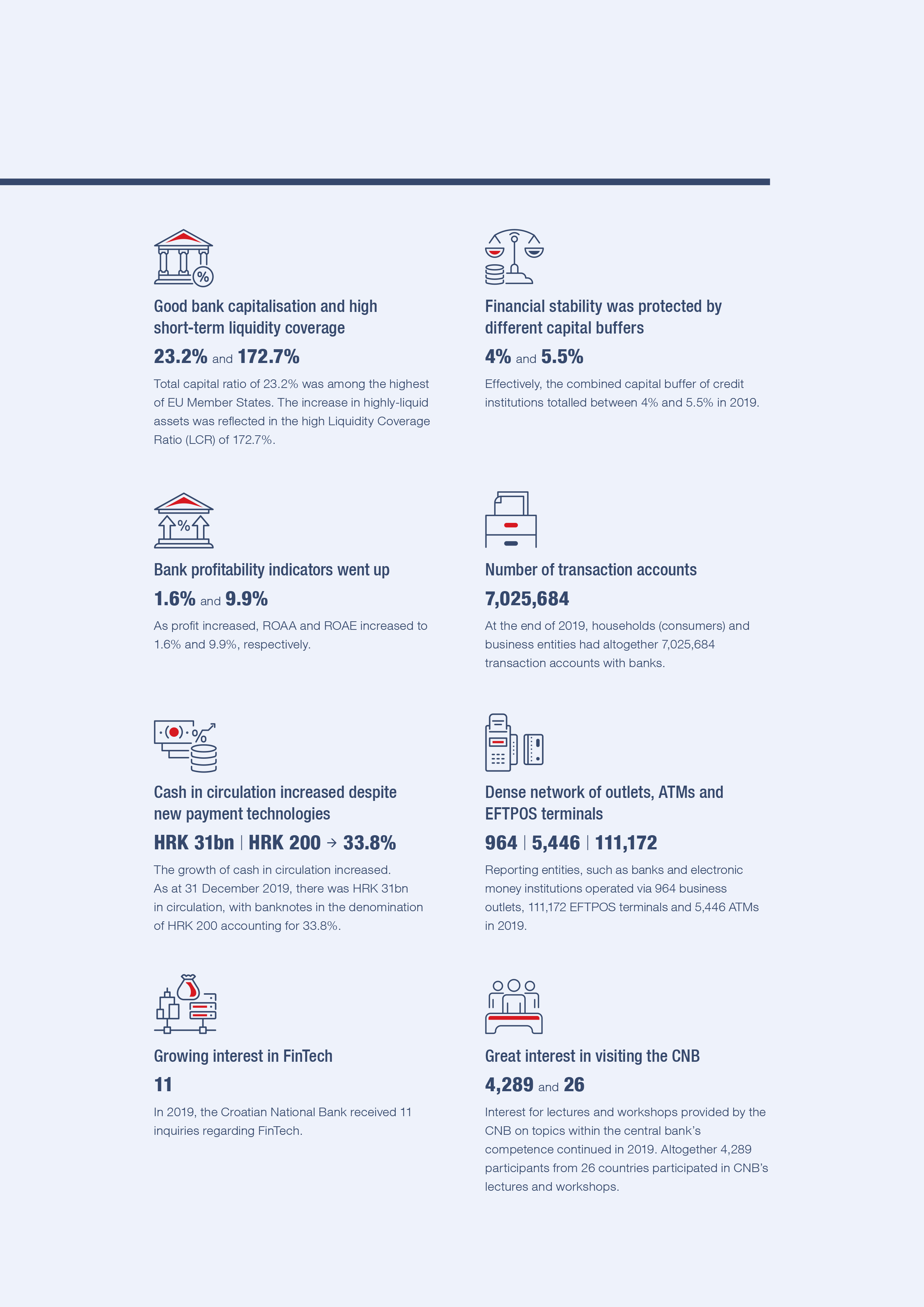
Monetary policy and economic developments
The growth in gross domestic product accelerated to 2.9% in 2019 from 2.7% in the year before. Such developments are the result of accelerated growth in foreign and domestic demand. Economic growth was mostly fuelled by the growth in total goods and services exports. Consumer price inflation slowed down in 2019, primarily due to a reduction in the rate of VAT on certain food and pharmaceutical products. The current and capital account surplus rose from 3.3% of GDP in 2018 to 5.0% of GDP in 2019.
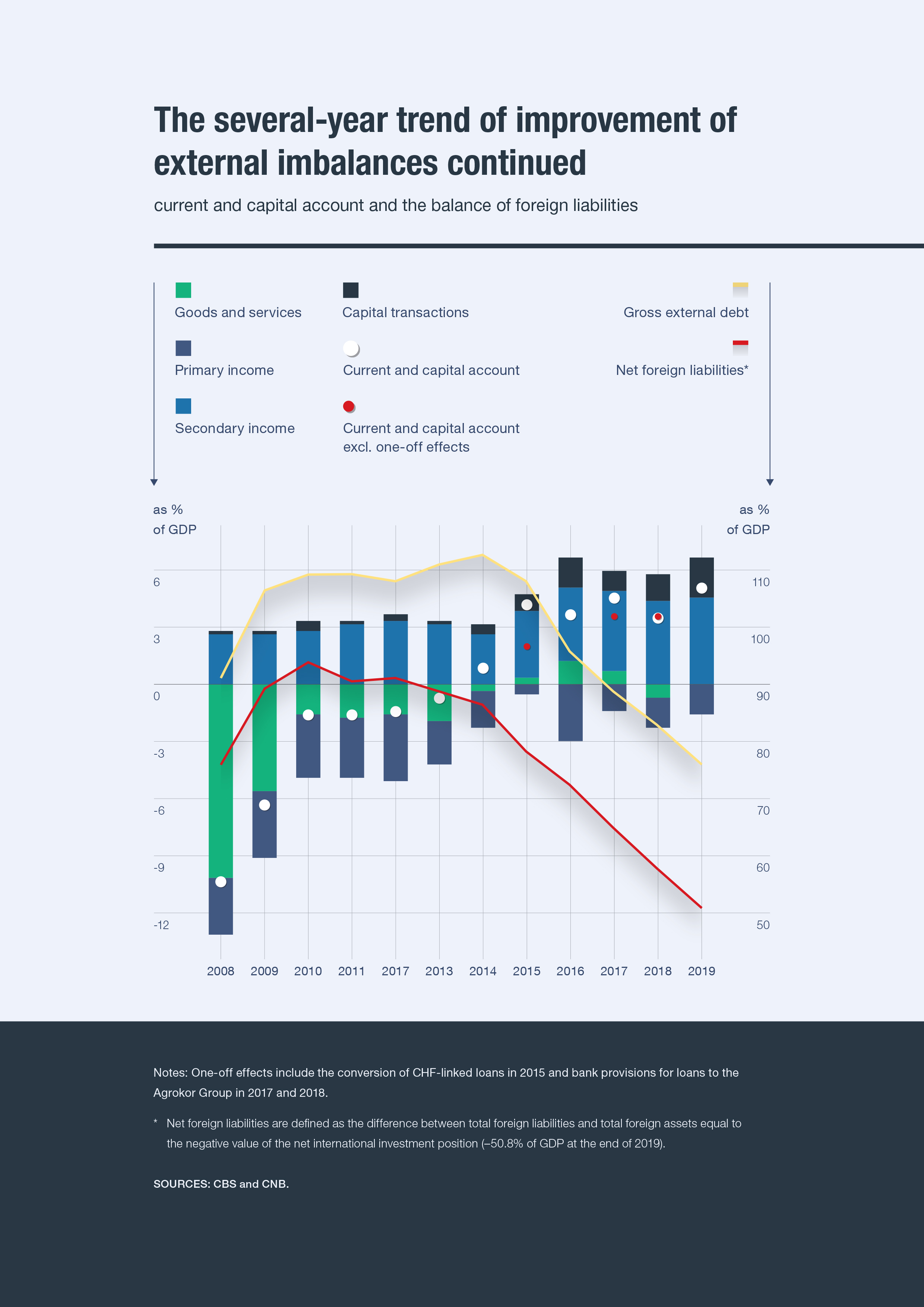
This was spurred by a further fast growth in tourism and more intensive use of EU funds. By contrast, the foreign trade deficit widened additionally. At the same time, external indebtedness of domestic sectors continued to shrink. The expansionary monetary policy of the CNB supported economic recovery in the conditions of a stable nominal exchange rate of the kuna against the euro maintained by the CNB. As a result, bank liquidity in 2019 was at the highest levels ever recorded, which led to a further fall in interest rates on loans and lending growth. The budget balance was maintained and the public debt to GDP ratio continued to trend downwards.
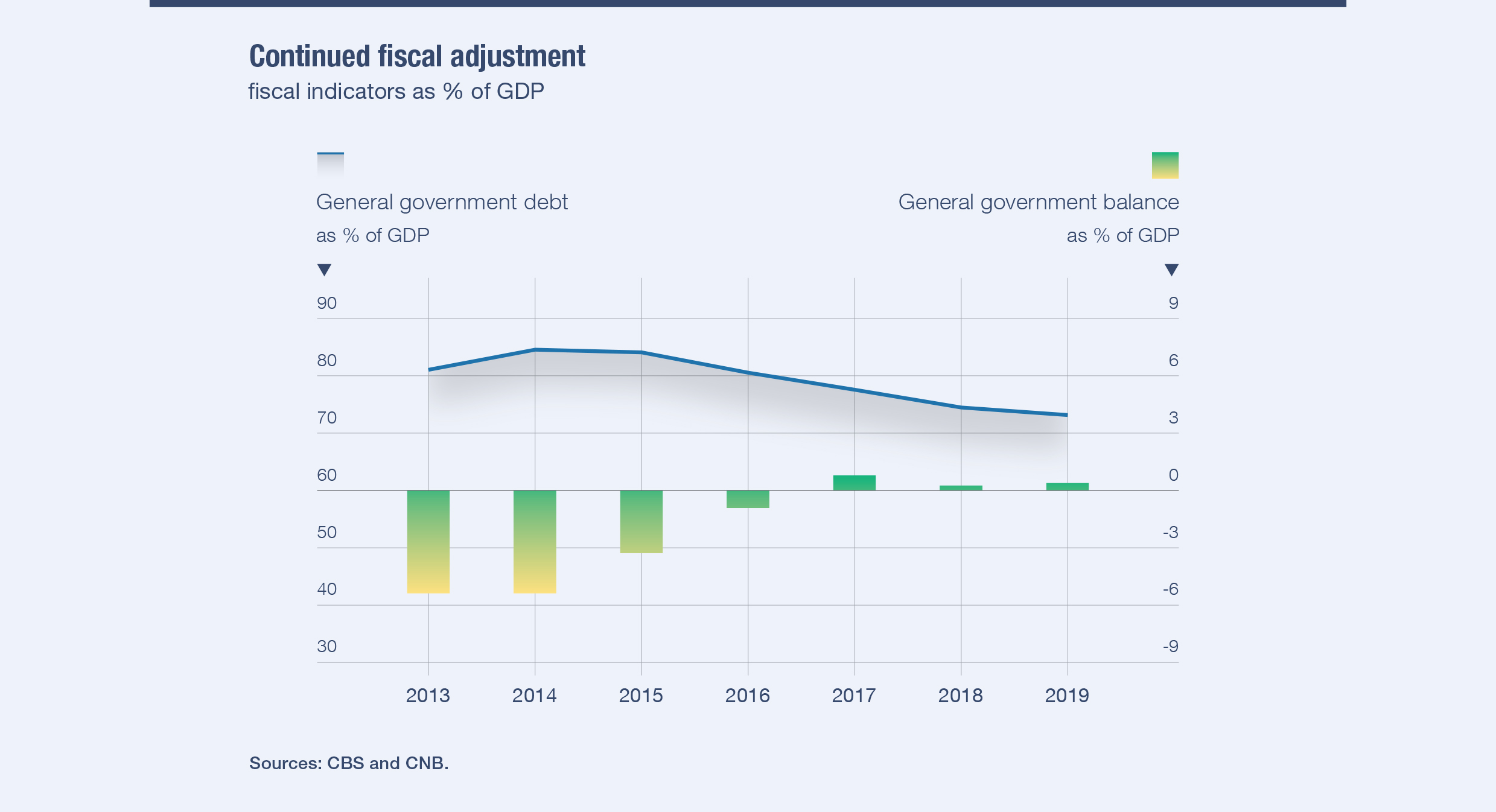
Financial stability
One of the tasks of the Croatian National Bank is to contribute to financial stability as a whole. To this end, the CNB continuously analyses systemic risks that may threaten financial stability and adopts measures to prevent the emergence of such risks, ensure their containment and strengthen the resilience of the entire financial system to sudden shocks. The developments in the domestic and international environment in 2019 mostly had a favourable impact on financial stability in Croatia. As a result, the assessment of financial system exposure to systemic risk has not changed much from the previous year and there was thus no need for adjustments to the existing measures and macroprudential policy instruments of the CNB. However, prompted by the possible risks associated with a strong growth in cash loans, towards the end of February 2019, the CNB issued a Recommendation on actions in granting non-housing consumer loans. Also, to enable better systemic risk monitoring, a process was initiated that was to establish a system for collecting all relevant information on loans granted to consumers.
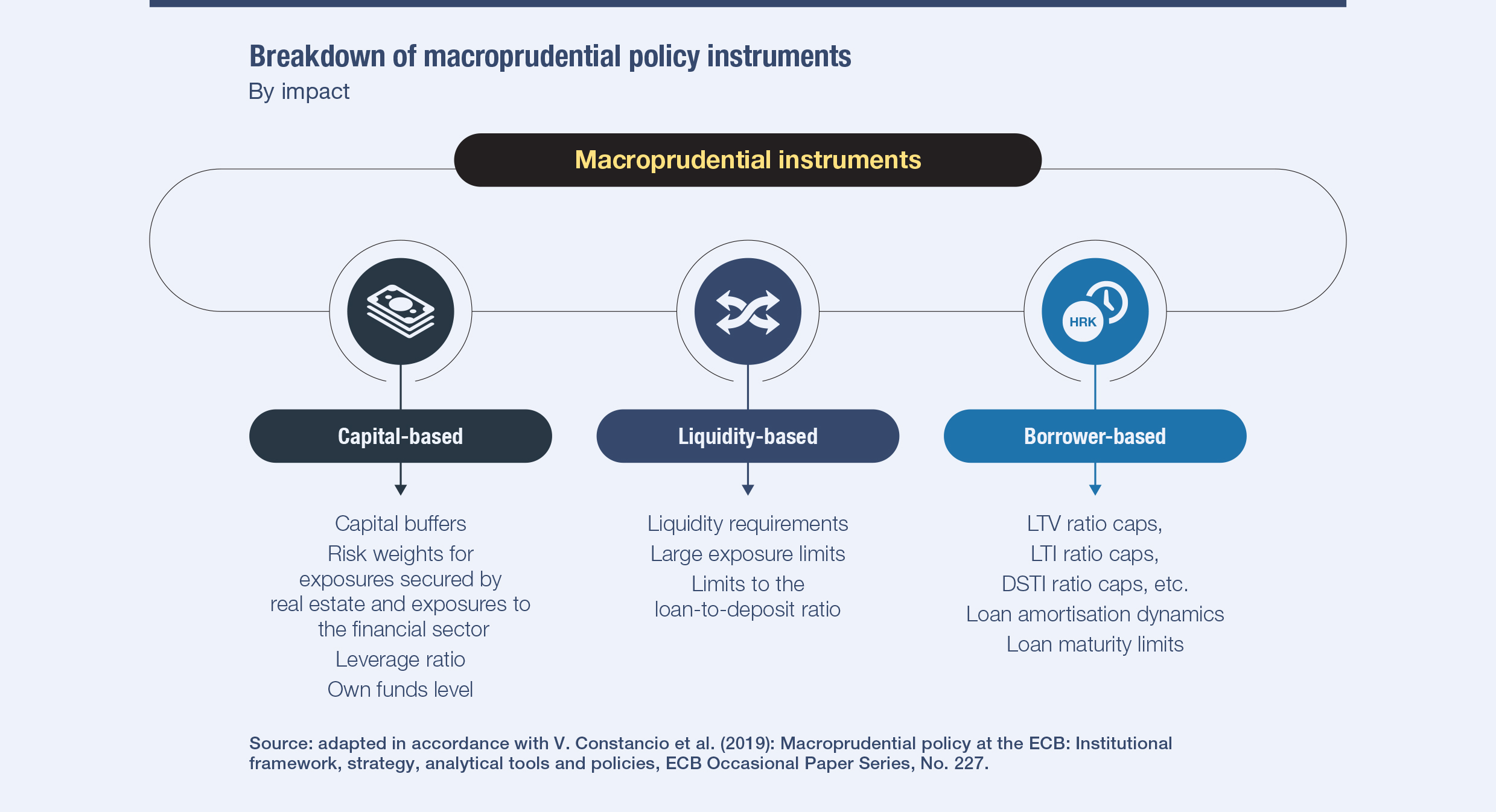
International reserves management
The international reserves of the Croatian National Bank continued to grow in 2019. The rise in international reserves was mostly driven by a large purchase of foreign currency from the banks, which ensured the stability of the exchange rate of the domestic currency and prevented excessive strengthening of the kuna against the euro. Although a long period of historically low interest rates on the global financial markets, which were even negative in the euro area, continued into 2019, a positive result and an adequate level of earnings from reserves management were achieved. At the same time, the key mandate in international reserves management – to ensure safety and liquidity – was successfully fulfilled.
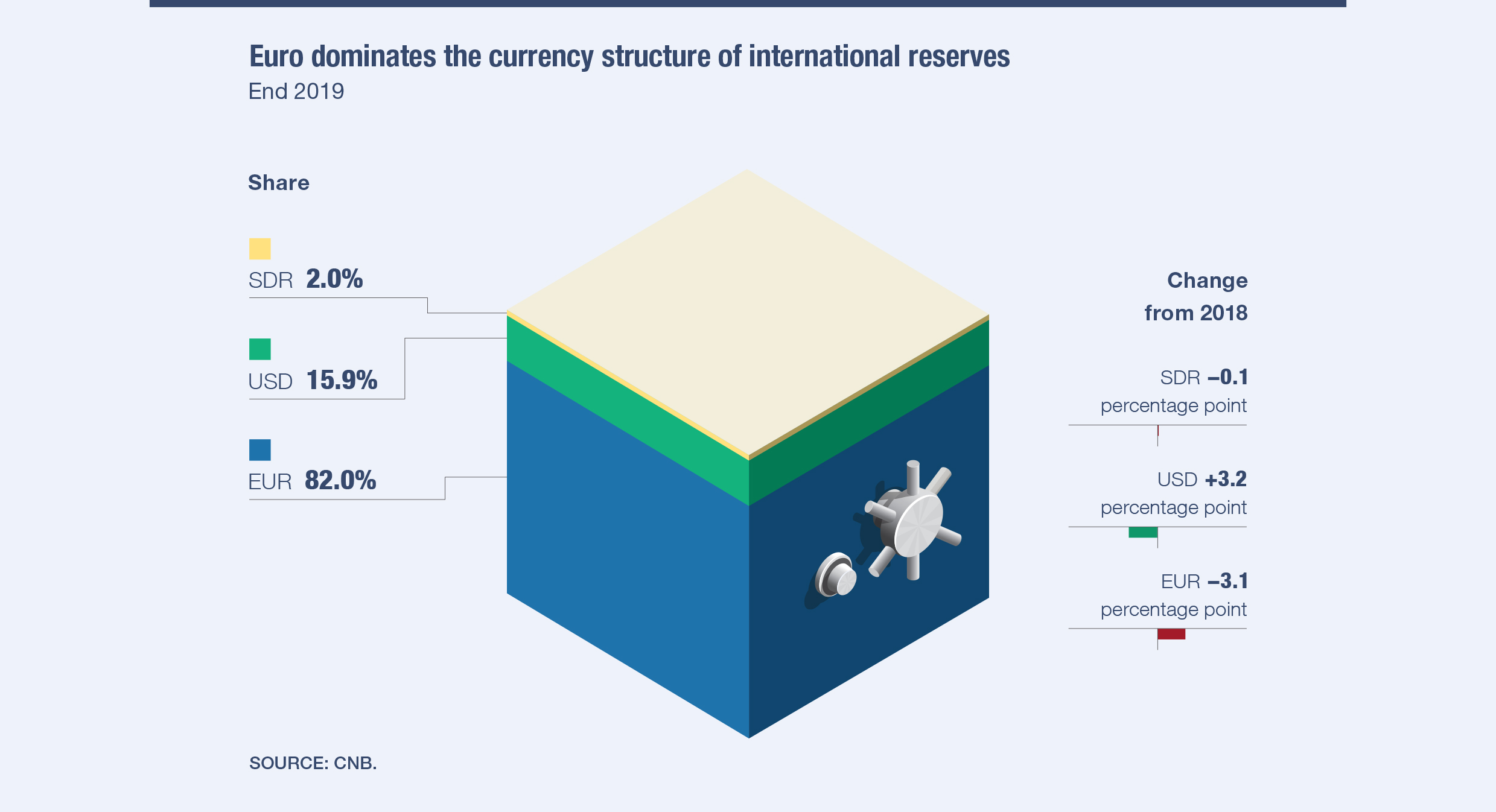
Supervision
In 2019, Croatian National Bank supervision fulfilled its main objectives of preserving safety and stability of the Croatian banking system. The banking system in 2019 was profitable, highly-liquid and well-capitalised. The Republic of Croatia applied to the European Central Bank (ECB) for the establishment of close cooperation in the framework of the Single Supervisory Mechanism in line with the requirements for joining the ERM II.
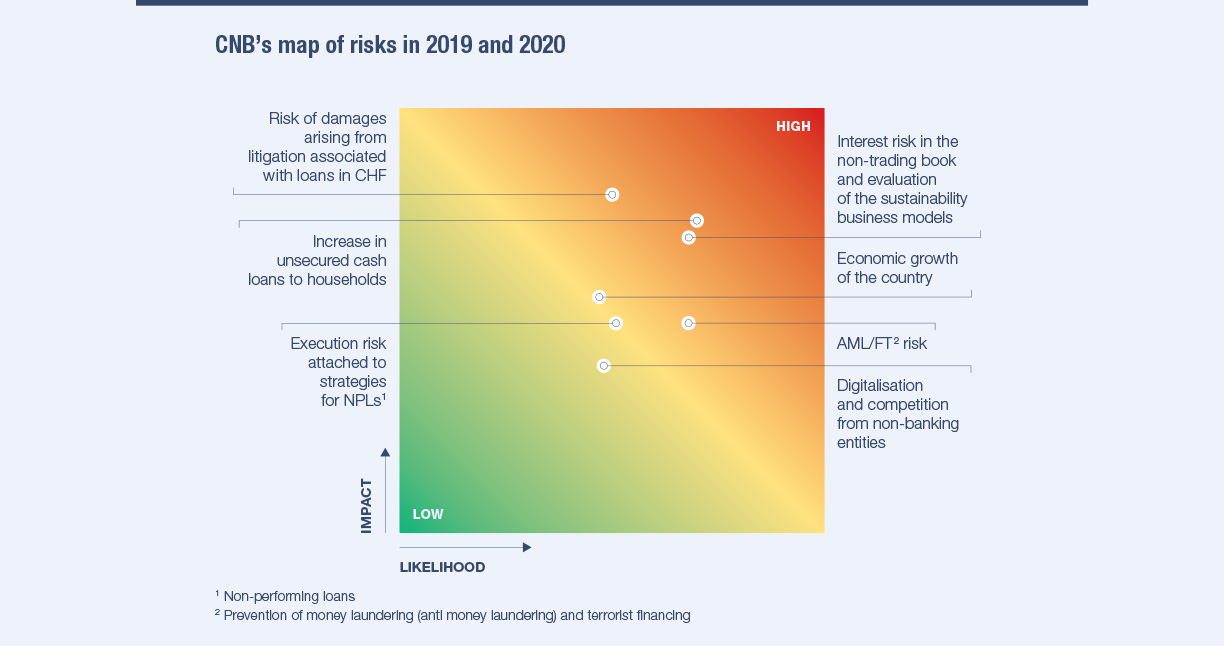
Based on this, the ECB adopted a decision on a comprehensive assessment of five Croatian banks, the results of which are expected in June 2020. The CNB monitors, on an on-going basis, the business of credit institutions by analysing regular reports and by conducting on-site examination, aligns the domestic legislation with relevant European regulations and participates in national and international efforts to prevent money laundering and terrorist financing.
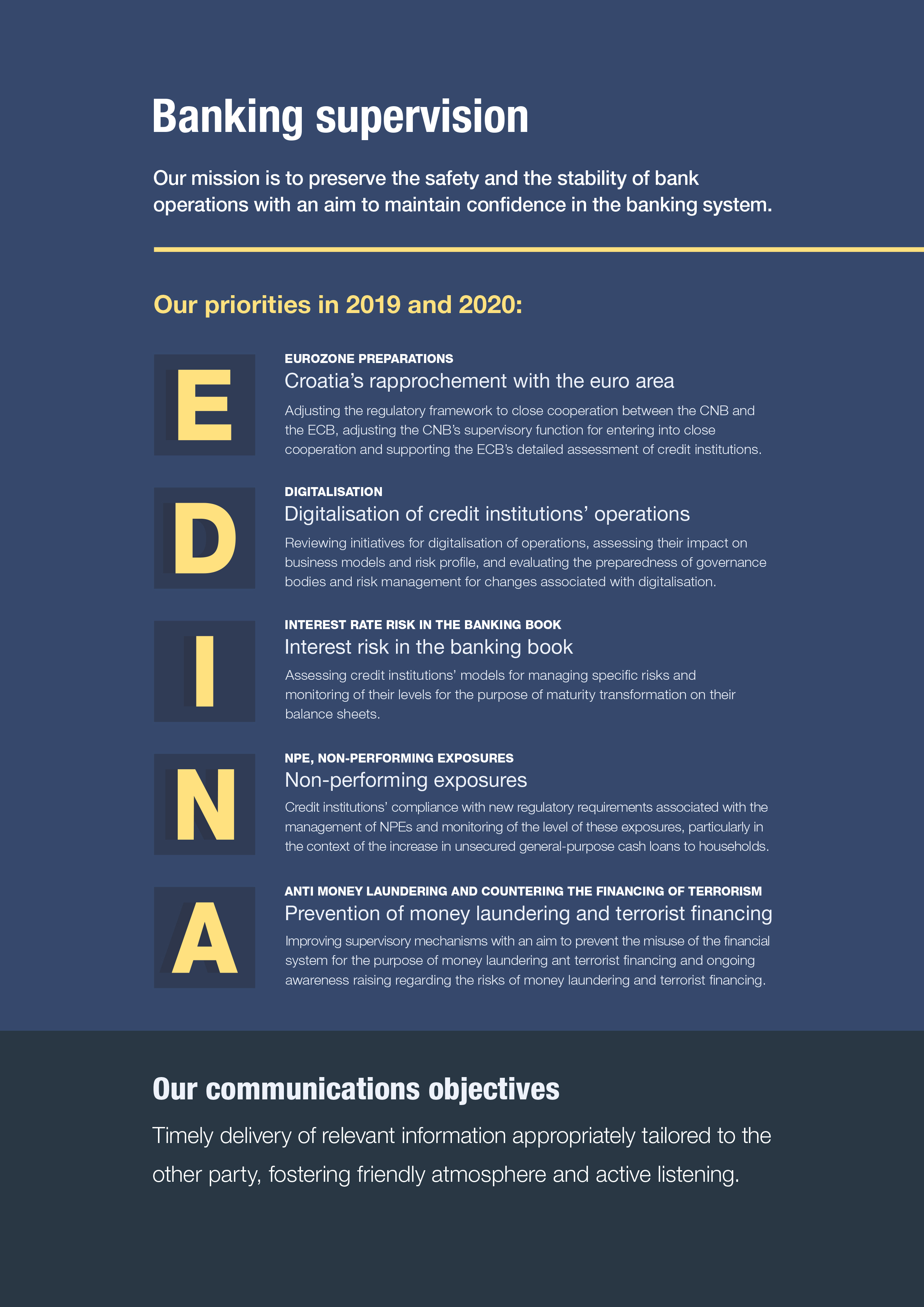
Resolution planning
In parallel with the establishment of close cooperation with the ECB and joining the Single Supervisory Mechanism, the Republic of Croatia will become a full member of the Single Resolution Mechanism. This will ensure that all credit institutions with a head office in the Republic of Croatia are on a level playing field with other credit institutions operating in the banking union.
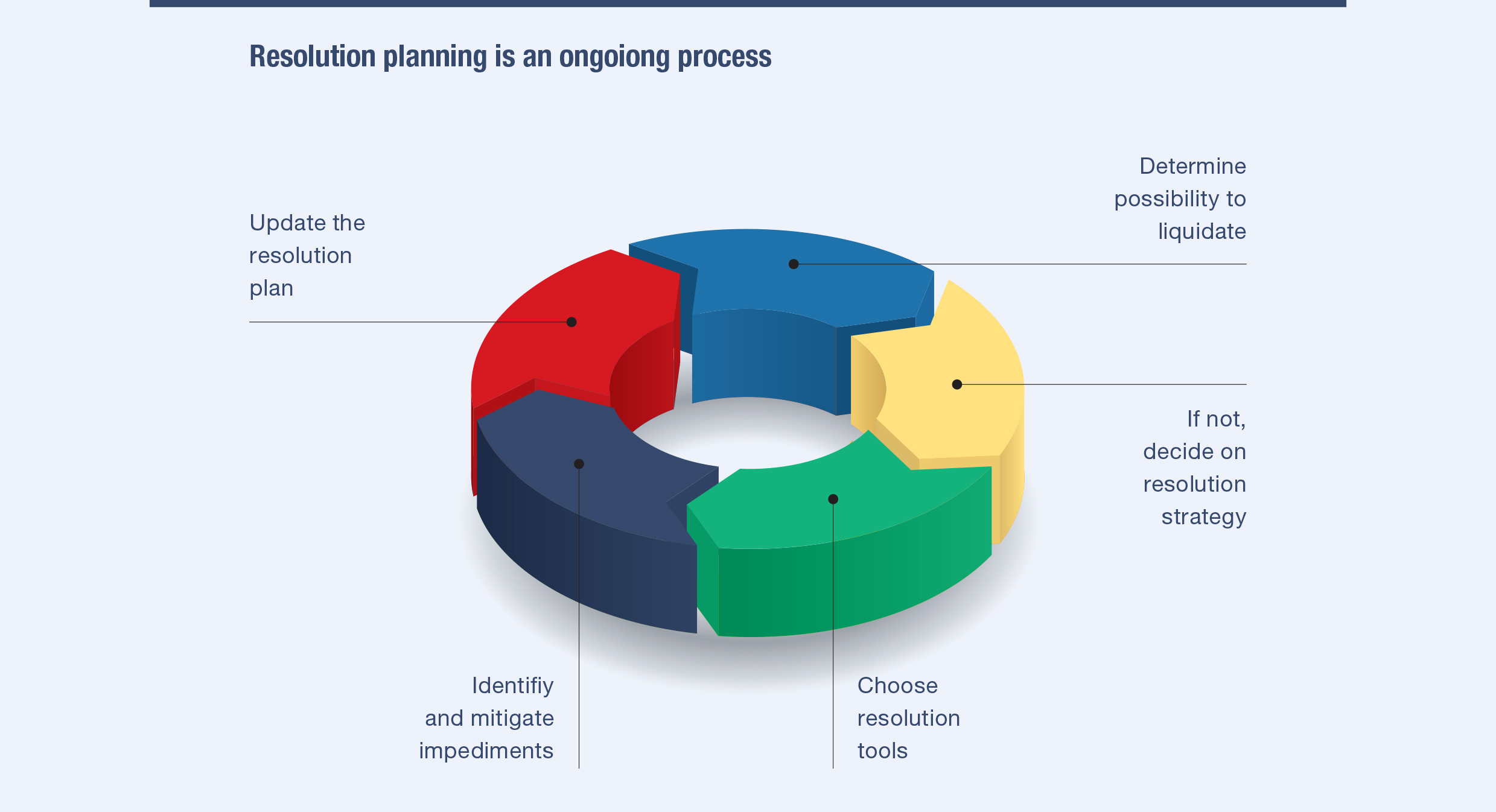
In addition to regular activities associated with resolution planning, the whole of 2019 was marked by preparations for joining the Single Resolution Mechanism.
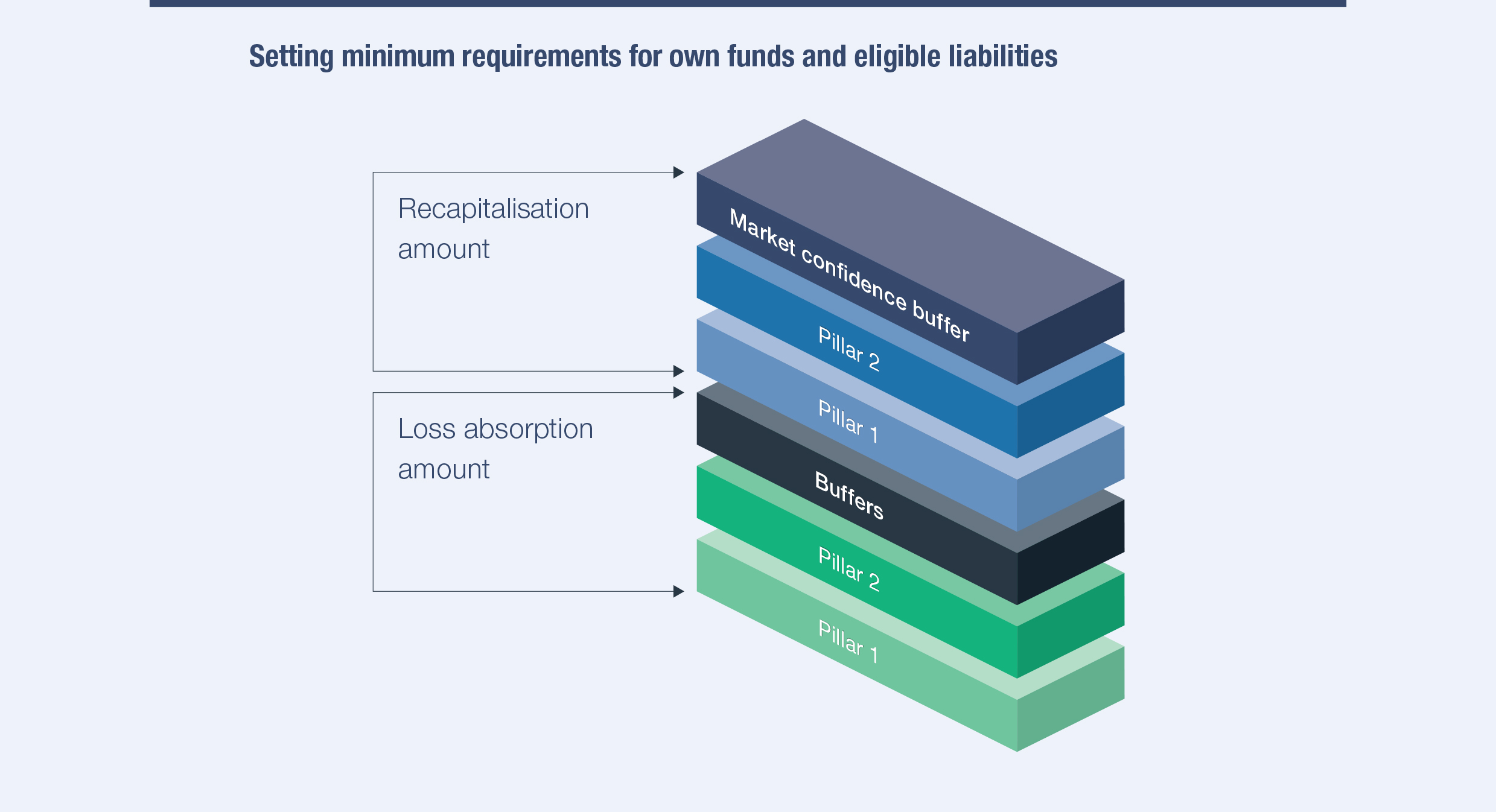
Statistics
The statistical function of the Croatian National Bank implies the collection and processing of information obtained from the reporting units and calculating statistical indicators based on that data. It also includes public disclosure and submission of information to financial and statistical bodies and organisations for the purpose of calculating and publishing transnational statistics and its use in economic analyses and research. The Croatian National Bank is one of the key competent authorities responsible for the official statistics of the Republic of Croatia. For the purpose of further strengthening the statistical function, the CNB reorganised the Statistics Area, published revised external statistics and stepped up efforts to adjust its statistical function with the requirements of the ESCB in the context of the Republic of Croatia’s joining the European Exchange Rate Mechanism and banking union.
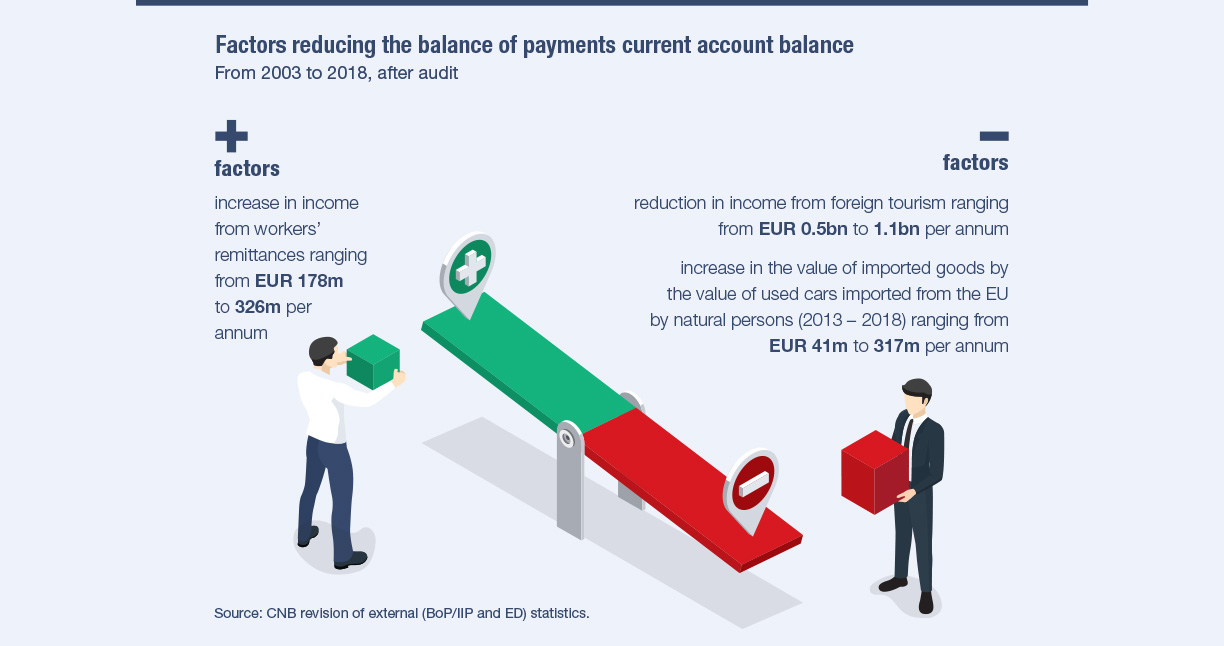
Research
The priorities of CNB’s research activities in 2019 were the introduction of the euro and research based on the Household Financial and Consumption Survey. The CNB organised two scientific conferences and a central banking part of the conference hosted by the Faculty of Economics in Split.
International relations
The Croatian National Bank is a member of the European System of Central Banks and actively participates in the execution of the tasks falling within the competence of the General Council of the European Central Bank. CNB representatives also participate in the work of the European Systemic Risk Board, the European Banking Authority and working bodies of the Council of the European Union and the European Commission.
The CNB is the fiscal agent of the Republic of Croatia and a depository of the IMF and also cooperates with other international multilateral financial institutions. Concluding Article IV consultations with the Republic of Croatia for 2019, Executive Directors welcomed solid economic growth and employment growth, noting that monetary policy was appropriately accommodative and banking system well-capitalised and liquid. They stressed that the achieved fiscal consolidation should be preserved by further prudent policy.
The process of euro adoption
On 4 July 2019, Croatia sent a letter of intent expressing the country’s intent to enter the European Exchange Rate Mechanism, jointly signed by the Minister of Finance and Governor of the Croatian National Bank, to EU institutions, euro area member states and Denmark as the only participant in the Exchange Rate Mechanism. Until May 2020, Croatia has to take a number of reform measures, two of which fall within the competence of the CNB: further strengthening of banking system supervision through the establishment of close cooperation between the CNB and ECB and strengthening of the framework for macroprudential policy implementation through the introduction of new borrower-based measures. The CNB continues to conduct various informative activities on the effect of adoption of the euro and will intensify them considerably once Croatia enters the Exchange Rate Mechanism.
Authorised currency exchange offices
Towards the end of 2019, there were 1,228 authorised currency exchange offices operating in Croatia that traded in 31 currency and generated a turnover of almost HRK 30bn, 85% of which in the euro.
CNB Consumer protection policy implementation
The CNB continuously works on raising awareness about the importance of protection of the rights and interests of consumers. Our initiatives have enhanced banking system transparency in respect of the supply of loans and the associated costs and payment transaction fees. The CNB acquainted credit institutions and other providers of financial and banking products and services falling within its competence with consumer rights by issuing opinions on the implementation of regulations in the area of consumer protection, holding bilateral meetings, carrying out supervision, etc. We have continued to provide financial education, in particular of young population but also of the general population. In addition, the CNB worked with credit institutions to increase their compliance with EU regulations and promote the quality of consumer protection and develop good practices in this area.
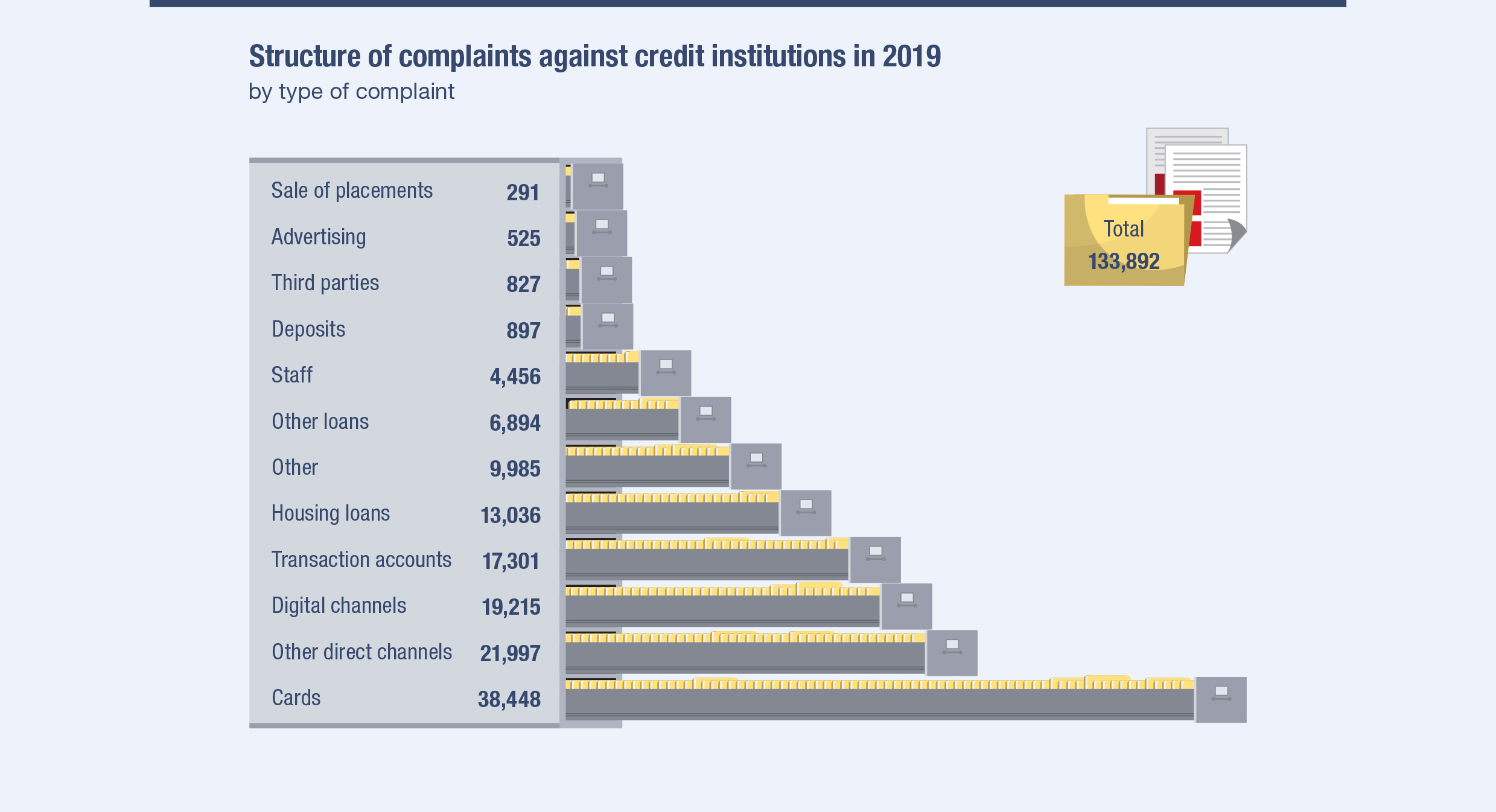
Payment operations
One of the basic tasks of the Croatian National Bank is to ensure smooth operation of the payment system, which includes payment services providers, payment system infrastructure, payment services users and regulations governing the payment system.
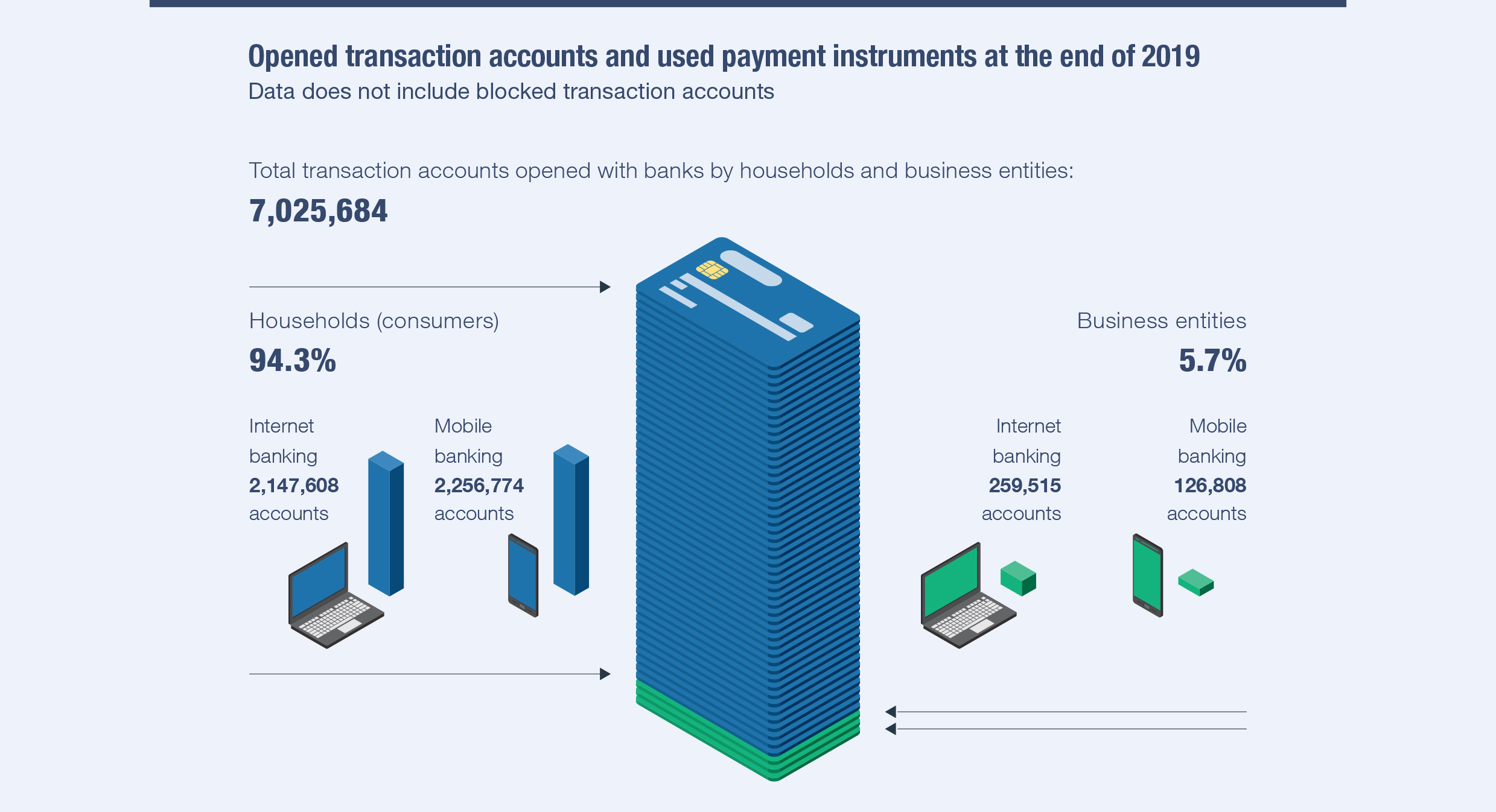
The Croatian National Bank plays a central role in ensuring the use of regulations, particularly as regards protection of the rights of payment system users, performs the function of a payment system operator and supervisor of systemically important payment systems and facilitates safe and efficient payment flows. The payment system and the retail payment market are influenced by innovation-led changes and the process of digitalisation. The role of the Croatian National Bank is twofold; as a catalyst it has to encourage innovation integration while promoting payment safety at the same time.
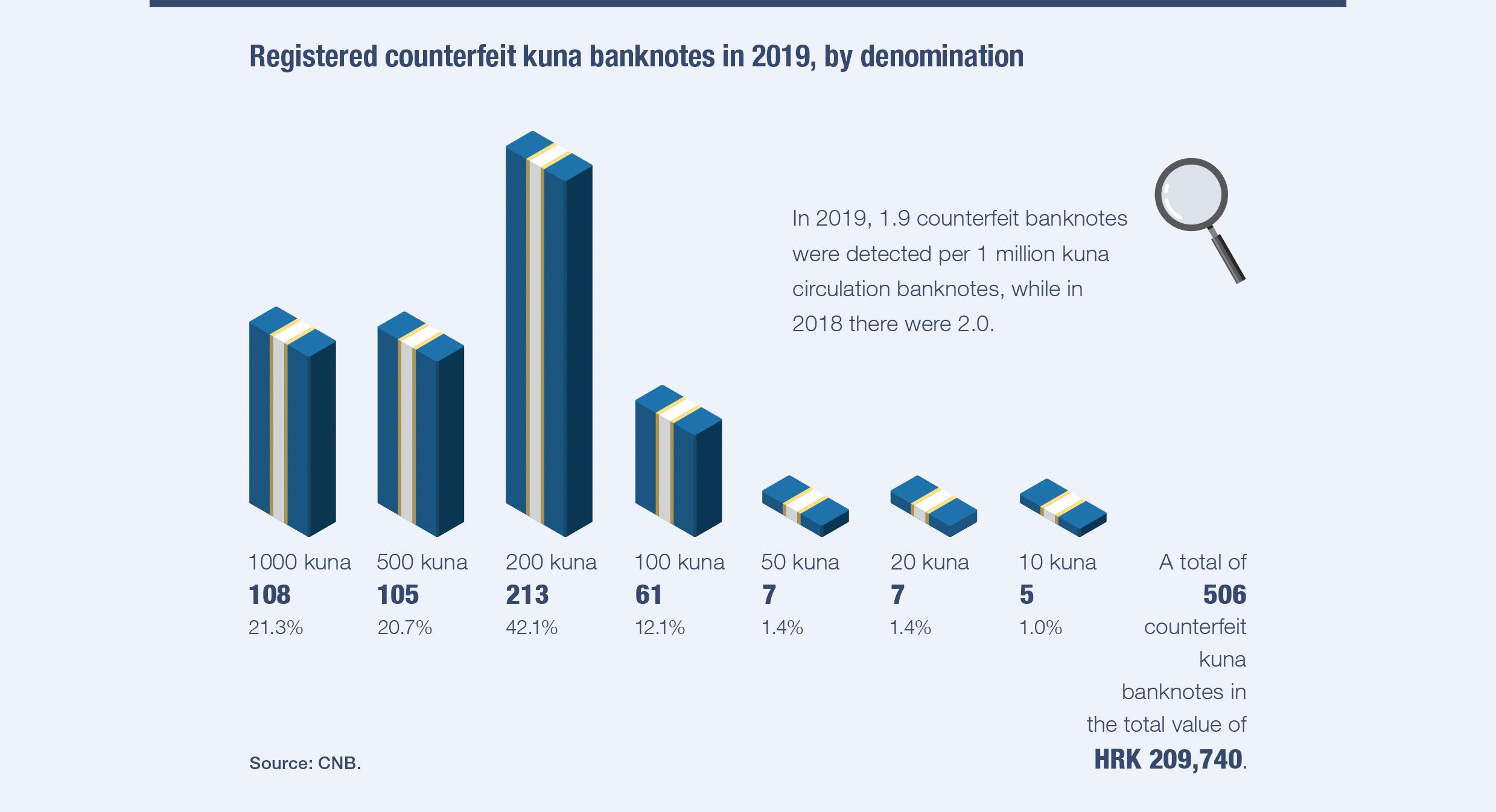
Currency department operations
One of the tasks of the Croatian National Bank is to ensure a smooth supply and an adequate amount of cash in the Republic of Croatia. In this regard, the CNB is responsible for planning the manufacturing of cash, delivery, storage, processing and organisation of distribution of cash, its protection from counterfeiting and destruction of cash unfit for circulation and manages the logistic and strategic cash reserves. In addition, the CNB defines the standards applied in the processing of cash at other institutions and monitors the implementation of regulations governing cash operations, supply, processing and redistribution of cash, with the aim of ensuring the quality of cash in circulation in accordance with public needs.
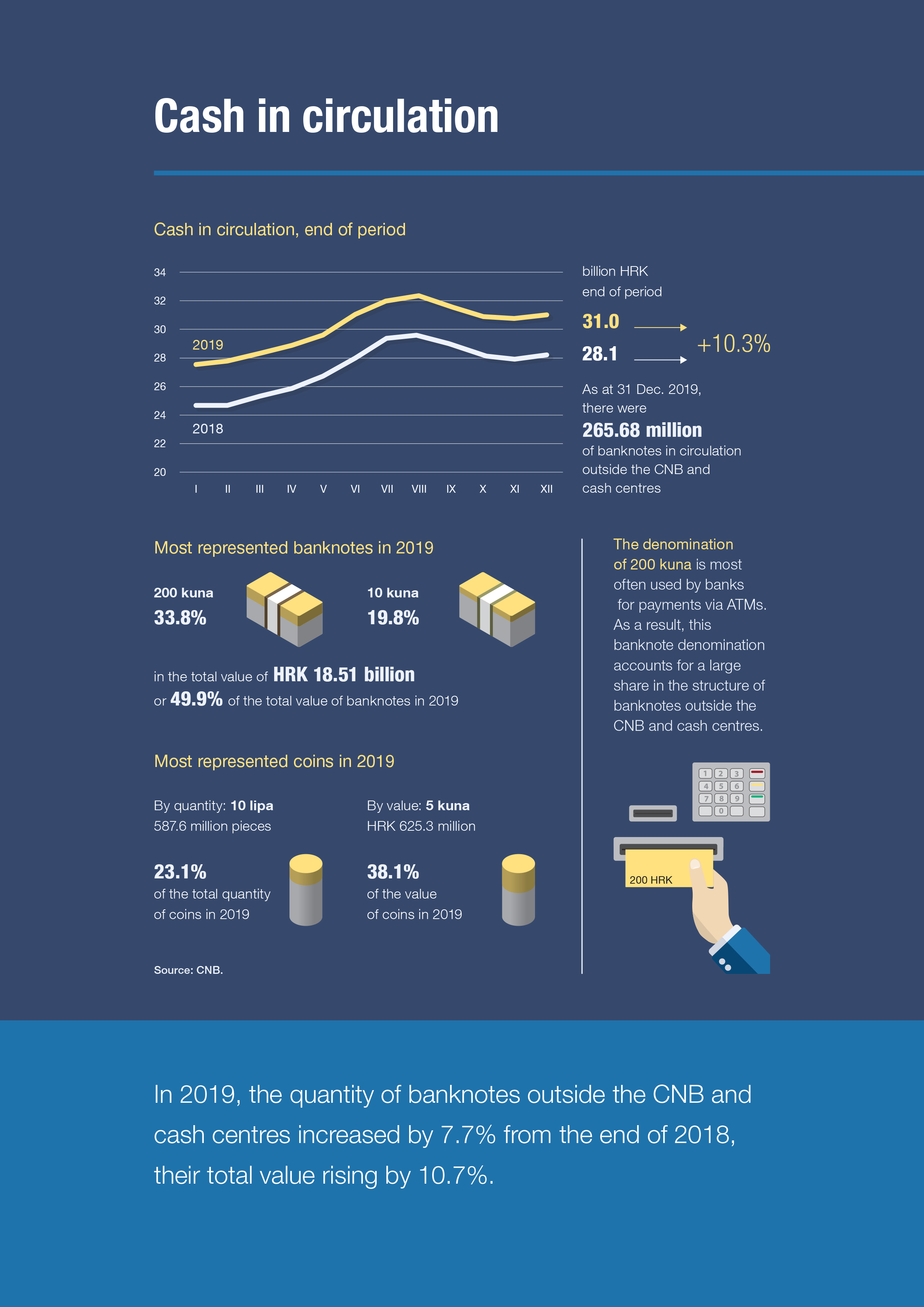
FinTech and Innovation Hub
In the broadest sense of the word, FinTech means innovative technology-based financial products and services. The CNB has been working actively on FinTech since 2017, i.e. since the establishment of the CNB intersectoral working group for FinTech that deals with advance technology-related banking and payment services as well as with a wider range of topics examining the impact of technological trends on the objective and tasks of the central bank. The Innovation Hub is a communication and information platform established in 2019 with the aim of providing non-binding and informal support to business entities developing an innovative fintech product or service.
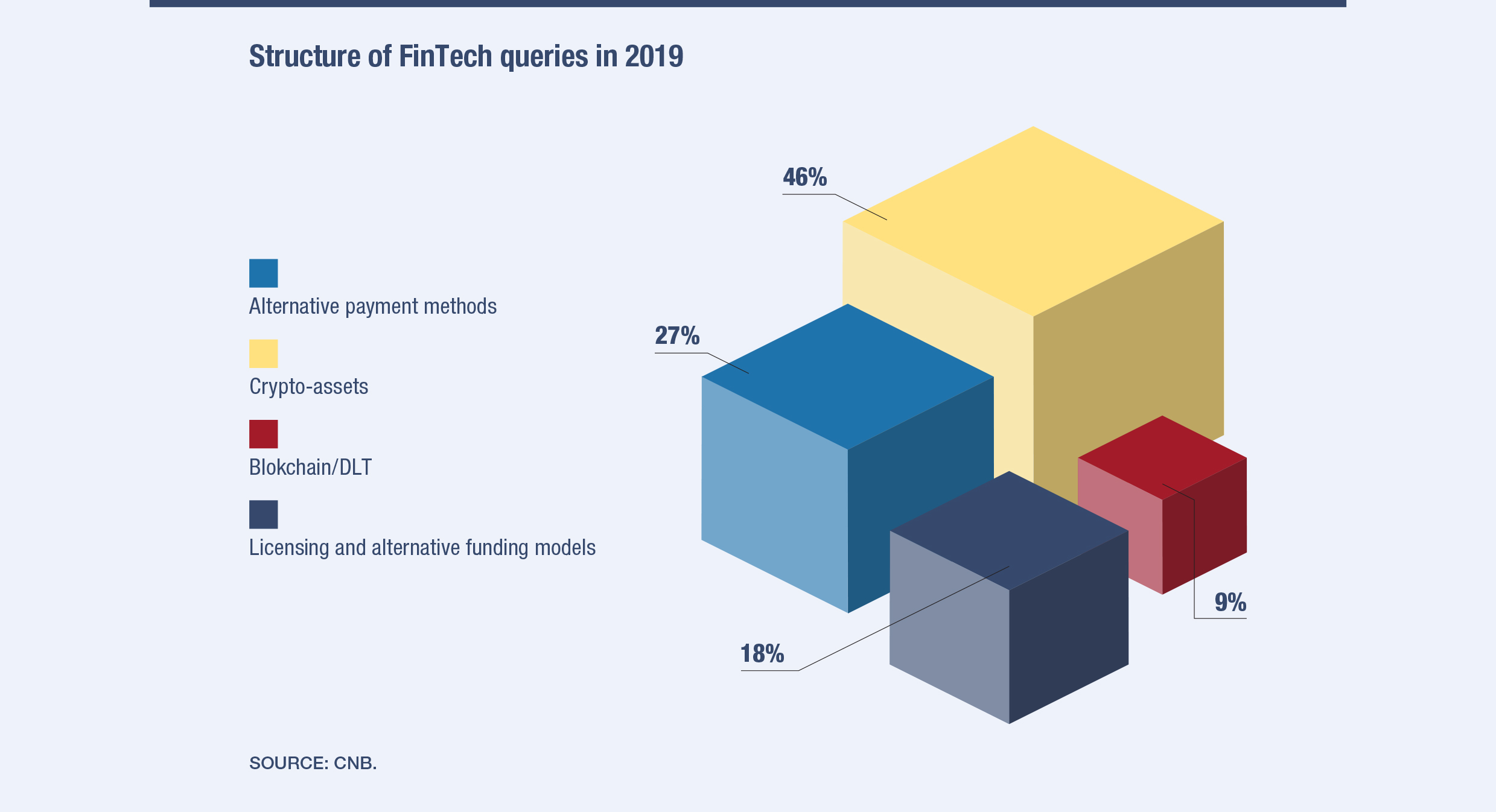
Public relations
One of the key tasks of the Croatian National Bank is to provide the fullest and most comprehensible information possible to the domestic and international public on its operations, objectives and the measures needed to attain them. Press releases, responses to inquiries, notifications for consumers, publications, conferences, meetings with journalists, economic workshops, lectures for schoolchildren and students, schoolchildren’s debates and communication on the social media – all these were actions taken by the Croatian National Bank in 2019 to enhance the provision of information to the general public. The Croatian National Bank has paid particular attention to strengthening two-way communication.
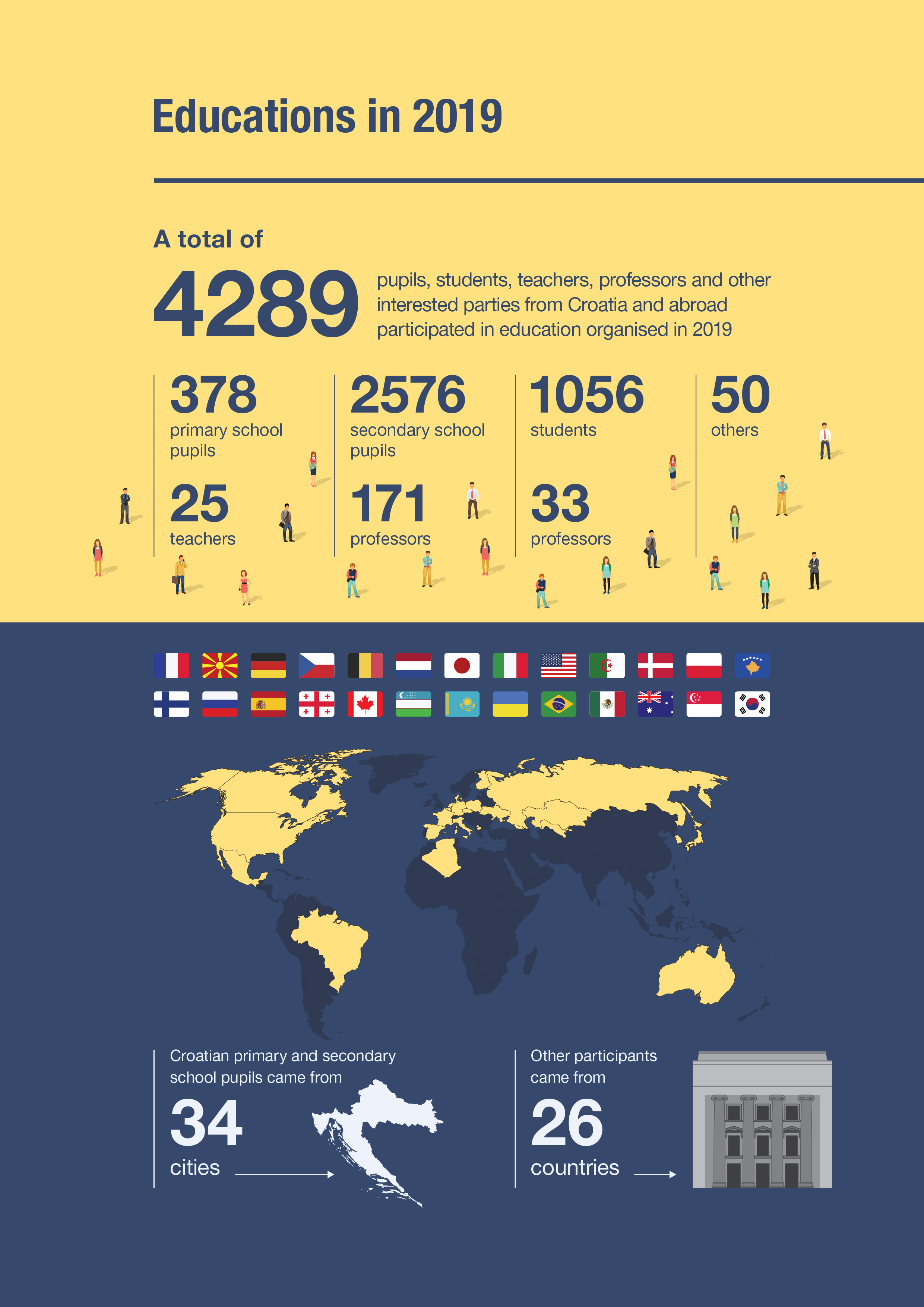
Organisation and human resources
The goal of human resource management at the Croatian National Bank is to attract, select, develop and retain experts of various profiles whose professional approach to work, knowledge, skills and competencies, coupled with a high level of commitment, will contribute to the realisation of CNB goals.
The Bank is committed to taking care of its employees on an on-going basis. It aims to achieve a good balance between business and private lives of its employees and it is an equal opportunity employer. This places the Croatian National Bank very high on the list of not so many employers who equally strive towards achieving a balance between business results and employee satisfaction, while respecting personal affinities and preferences of employees.
